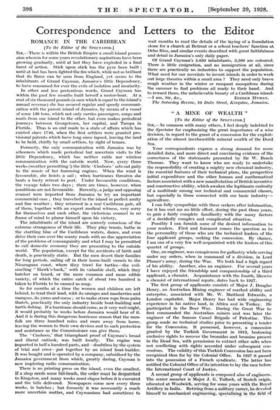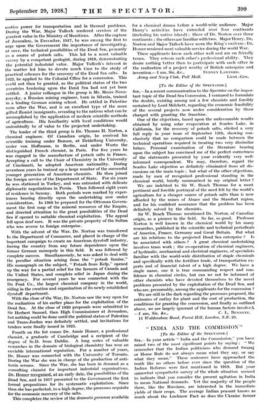" A MINE OF WEALTH " [To the Editor of
the SPECTATOR.] SIR,—In common with many others, I feel deeply indebted to the Spectator for emphasizing the great importance of a wise decision, in regard to the grant of a concession for the exploit- ation of the almost inexhaustible mineral wealth of the Dead Sea.
Your correspondents express a strong demand for more detailed data, and more direct and convincing evidence of the correctness of the statements presented by Sir W. Beach Thomas. They want to know who are ready to undertake the responsibility of creating a mighty new chemical industry, the essential features of their technical plans, the prospective initial expenditure and the other human and mathematical factors associated with a new manifestation of British inventive and constructive ability, which awaken the legitimate curiosity of a multitude among our technical and commercial classes, but especially in _those connected with our basic industry— agriculture.
I can fully sympathize with these seekers after information, for it has cost me no little effort, during the past three years, to gain a fairly complete familiarity with the many factors of a decidedly complex and complicated situation.
Possibly I can furnish some of the desired information to your readers. First and foremost comes the question as to the personality of those who are the technical leaders of the four applicant groups, seeking the concession. By chance, I am one of a very few well acquainted with the leaders of this quartet of groups.
One, an engineer, was conspicuous for gallantry while serving under my orders, when in command of a division, in Lord Plumer's army, during the War. We both had a high regard of his ability. Another, also an engineer. For several years I have enjoyed the friendship and companionship of a third applicant, a chemist. Acquaintance with the fourth, likewise a chemist of international repute, dates back to 1927.
The first group of applicants consists of Major J. Douglas Henry, an Australian Mining engineer of marked ability and enterprise, associated with Mr. W. Maitland Edwards, a London capitalist. Major Henry has had wide engineering experience in his native land, in Africa and in Turkey. He participated in the Boer War. During the Great War he first commanded the Australian miners and was later the engineer of the famous Camel Brigade of Palestine. This group made no technical studies prior to presenting a tender for the Concession. It possessed, however, a concession granted by the Turkish Government in 1913, bestowing exclusive rights to recover the bromides and bromine present in the Dead Sea, with permission to extract other salts when not conflicting with rightS accorded under subsequeat con- cessions. The validity of this Turkish Concession has not been recognized thus far by the Colonial Office. In 1927 it passed into the posiession of a French syndicate. The latter has notified the Colonial Office of its intention to lay the case before the International Court of Justice.
A second group of applicants is composed also of engineers. The senior member is Major J. G. Tulloch, of Scotch origin,, educated at Woolwich, serving for some years with the Royal Artillery in India. Retiring fro:5m a militarY career, he devoted himself to mechanical engineering, specializing in the field of
motive power for transportation and in thermal problems. During the War, Major Tulloch rendered services of the greatest value in the Ministry of Munitions. After the capture of Jerusalem, in December, 1917, he was among the first to urge upon the Government the importance of investigating, at once, the technical possibilities of the Dead Sea, primarily as a source of potash salts. This led to a most valuable survey by a competent geologist, during 1918, demonstrating the potential industrial value. Major Tulloch's interest in the -matter led him to devote much time to the study of practical schemes for the recovery of the Dead Sea salts. In 1922, he applied to the Colonial Office for a concession. This could not then be granted, as the political status of the two countries bordering upon the Dead Sea had not yet been settled. A junior colleague in the group is Mr. Moses Novo- meysky, a Russian mining engineer, born in Siberia, trained
in a leading German mining school. He settled in Palestine soon after the War, and is an excellent type of the more
gifted Zionist immigrants, revealing to the natives what can be accomplished by the application of mcdern scientific methods of agriculture. His familiarity with local conditions would undoubtedly be of value to the projected undertaking.
The leader of the third group is Dr. Thomas H. Norton, a chemical engineer. Of Canadian origin, he received his scientific training under Bunsen, at Heidelberg University, under von Hoffmann, in Berlin, and under Wurtz the distinguished French chemist, in Paris. For five years he was engaged in the manufacture of potash salts in France.
Accepting a call to the Chair of Chemistry in the University of Cincinnati, he adopted American nationality. During seventeen years he trained up a large number of the successful younger generation of American chemists. He then joined the foreign service of the Department of State. For six years he was stationed in Turkey, and was entrusted with delicate diplomatic negotiations in Persia. Then followed eight years of residence in Saxony. Both periods were marked by exper- iences bearing directly upon the undertaking now under consideration. In 1900 he prepared for the Ottoman Govern- ment the first map of the mineral resources of the Empire, and directed attention to the great possibilities of the Dead Sea if opened to suitable chemical exploitation. The appeal fell upon deaf ears. It was the private property of the Sultan who was averse to foreign enterprise.
With the advent of the War, Dr. Norton was transferred to the Department of Commerce, and placed in charge of the important campaign to create an American dyestuff industry, freeing the country from any future dependence upon the former German monopoly in this field. It was followed by complete success. Simultaneously, he was asked to deal with the peculiar situation arising from the " potash famine." His monograph on the subject, " Potash from Kelp," opened up the way for a partial relief for the farmers of Canada and the United States, and complete relief in Japan during the emergency. For several years he was connected with the Du Pont Co., the largest chemical company in the world, aiding in the creation and organization of its newly established dyestuff department.
With the close of the War, Dr. Norton saw the way open for the realization of his earlier plans for the exploitation of the Dead Sea. At the close of 1920 proposals were submitted to Sir Herbert Samuel, then High Commissioner at Jerusalem, but nothing could be done until the political status of Palestine and Trans-Jordan was definitely settled, and invitations for tenders were finally issued in 1925.
Fourth on the list comes Dr. Annie Homer, a professional chemist, a graduate of Cambridge and a recipient of the degree of Se.D. from Dublin. A long series of valuable researches in the domain of biological chemistry has won an enviable international reputation. For a number of years, Dr. Homer was connected with the University of Toronto. During the War she was in charge of the production of anti- toxin serums. Since the War, she has been in demand as a consulting chemist for important industrial organizations. Dr. Homer recognized, at an early date, the possibilities of the Dead Sea, and in 1917 presented to the Government the first formal propositions for its systematic exploitation. Since then she has perfected, to a high degree, the processes requisite for the economic recovery of the salts.
This completes the review of the dramatis personae available for a chemical drama before a world-wide audience. Major Henry's activities have -extended over Tour continents (including his native island) ; those of Dr. Norton over three continents ; the others arc familiar with two. Major'Henry, Dr. Norton and Major Tulloch have worn the King's uniform ; Dr. Homer rendered most valuable service during the world War.
These applicants know each other well and are on friendly terms. They esteem each other's professional ability. They desire nothing better than to participate with each other in the realization of a project worthy of British enterprise and
Army and Navy Club, Pall Mall. Lieut.-Gen.





































 Previous page
Previous page